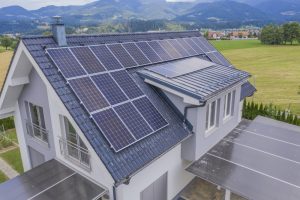Solar power panels and their installation on residential and commercial premises have recently attracted a lot of attention. There are valid reasons for this curiosity. The financial advantages of solar power panels go far beyond just lowering your electricity cost. Here are a few straightforward economic benefits that demonstrate why installing a solar system might be a smart financial move.
Reduced Energy Costs

One of the most obvious economic benefits of installing solar power panels is the reduction in energy costs. Your monthly utility bills can be greatly reduced if you use the sun’s energy to generate electricity. Appliances, lighting and heating & cooling systems in your home can all be powered by solar panels, which collect sunlight and convert it to electricity.. This means you’ll rely less on electricity from your utility company, leading to substantial savings over time.
Income Generation through Net Metering
Net metering is a system that allows solar panel owners to earn money by selling excess electricity back to the grid. When your solar system generates more electricity than you use, the surplus is fed into the grid, and you receive credits on your utility bill. This can result in additional income for you, making your solar investment even more financially attractive.
Solar Tax Credits and Incentives
Governments and local authorities often offer tax credits and incentives to encourage solar panel installation. These incentives can significantly offset the initial cost of your solar system. Federal tax credits, for example, can cover a substantial portion of your installation expenses, making it a more affordable option.
Increased Property Value
A solar power system can increase the value of your property. Potential buyers are increasingly looking for energy-efficient homes, and solar panels can be a significant selling point. Homes with solar panel installations tend to sell faster and at higher prices than those without. This means that not only will you benefit from lower energy bills while you own the property, but you’ll also reap the rewards if you decide to sell in the future.
Environmental Benefits
While not directly economic, it’s worth mentioning that solar power panels also contribute to a cleaner environment. By reducing your reliance on fossil fuels, you help reduce greenhouse gas emissions and combat climate change. This can lead to long-term economic benefits by mitigating the costs associated with environmental damage and climate-related events.
FAQs About Solar Power Panels
Q: How do solar power panels work?
A: Solar power panels work by capturing sunlight and converting it into electricity through a process called photovoltaics. Solar cells within the panels absorb photons from sunlight, freeing electrons and creating an electrical current.
Q: What is the cost of a solar system installation?
A: The cost of a solar system installation can vary depending on factors such as the size of the system, location, and government incentives. On average, residential solar installations can cost between $10,000 and $30,000, but the long-term savings often outweigh the initial investment.
Q: Do solar panels require maintenance?
A: Solar panels are relatively low-maintenance. They require occasional cleaning to remove dirt and debris, and you may need to replace the inverter after about 10-15 years. Overall, maintenance costs are minimal compared to the savings generated by the system.
Q: How long does it take to recoup the investment in solar panels?
A: The payback period for solar panels can vary, but it typically ranges from 5 to 10 years. After this period, you’ll start enjoying significant savings on your energy bills, and any income from net metering will be a bonus.
Q: Can I go off-grid with solar panels?
A: It’s possible to go off-grid with a solar power system, but it usually requires additional equipment such as energy storage batteries. Going off-grid may have a higher upfront cost, but it can provide energy independence in the long run.
In general, installing solar power panels on your property can bring numerous economic benefits. From reducing your energy costs and earning income through net metering to enjoying tax credits and increasing your property’s value, the financial advantages are substantial. Additionally, solar power panels contribute to a greener environment, providing long-term economic benefits beyond monetary savings. As solar technology continues to advance and become more affordable, it’s an investment that makes both financial and environmental sense.